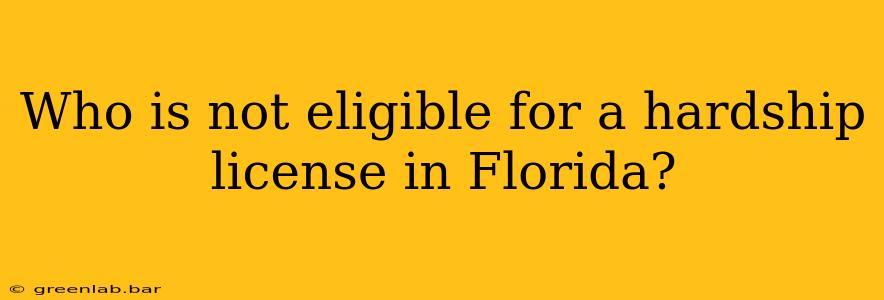Navigating the Florida Department of Highway Safety and Motor Vehicles (FLHSMV) system can be tricky, especially when dealing with license suspensions and hardship licenses. Understanding who qualifies—and crucially, who doesn't qualify—for a hardship license is vital. This article will clarify the ineligibility criteria for a Florida hardship driver's license, ensuring you're fully informed.
Understanding Florida Hardship Licenses
Before diving into ineligibility, let's briefly define what a hardship license is in Florida. A hardship license allows individuals with suspended licenses to drive under very specific circumstances, typically for work or essential needs like medical appointments. It's not a free pass; it comes with strict limitations and responsibilities. Think of it as a heavily restricted driving privilege, granted only in cases of demonstrated necessity.
Key Ineligibility Criteria for a Florida Hardship License
Several factors can disqualify you from obtaining a hardship license in Florida. These are not exhaustive, and specific circumstances may influence eligibility, so it's crucial to contact the FLHSMV directly for your unique situation. However, these are some of the most common reasons for denial:
1. Serious Traffic Offenses:
Holding a suspended license due to serious traffic offenses significantly reduces your chances of getting a hardship license. Examples include:
- Driving Under the Influence (DUI): Multiple DUI convictions or a recent DUI conviction generally disqualifies you. The severity of the offense and any related factors heavily influence the decision.
- Reckless Driving: Multiple reckless driving convictions often bar you from receiving a hardship license.
- Hit and Run: Involvement in a hit-and-run accident is a serious offense likely to result in ineligibility.
2. License Revocation:
If your license has been revoked, not merely suspended, the likelihood of receiving a hardship license is considerably lower. Revocation is usually reserved for more serious infractions.
3. Failure to Comply with Previous Orders:
Previous failures to comply with court orders, such as completing community service or paying fines associated with a traffic violation, significantly impact your eligibility. The FLHSMV carefully reviews your history.
4. Outstanding Fines and Fees:
Unpaid fines and fees associated with your driving record can be a major obstacle. The FLHSMV often requires full payment before considering a hardship license application.
5. Prior Hardship License Violations:
If you have previously been issued a hardship license and violated its terms (e.g., driving outside permitted times or purposes), your application for a new one will likely be denied.
6. Certain Criminal Convictions:
Depending on the nature and severity of the crime, certain criminal convictions—even unrelated to driving—can impact your eligibility for a hardship license.
The Importance of Consulting the FLHSMV
The information provided here is for general guidance only. The specific eligibility requirements for a hardship license can be complex and vary depending on individual circumstances. Always consult the Florida Department of Highway Safety and Motor Vehicles directly or seek advice from a qualified legal professional. They can provide accurate, up-to-date information and guidance based on your specific situation. Don't rely solely on online information; contact the FLHSMV to ensure a thorough understanding of your eligibility.
This information is for educational purposes only and should not be considered legal advice. Always consult with a legal professional for advice tailored to your specific situation.

